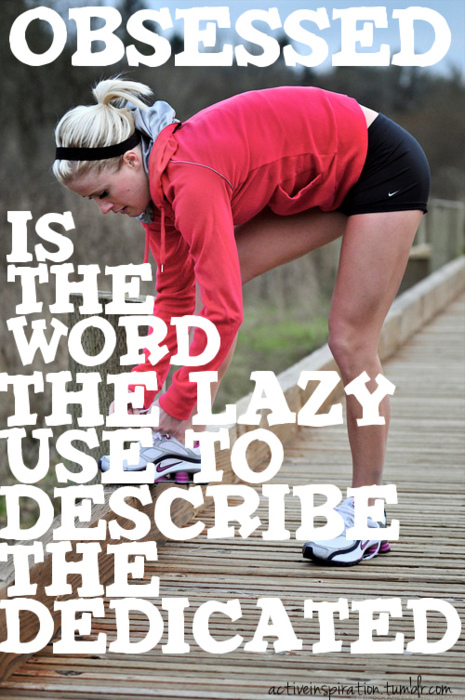Hello, hello! Today’s post is coming up a bit sooner than usual because tonight I desperately need to take Benadryl, which will likely knock me out. Let’s just say I’m not responding well to the single peanut butter egg I had on Easter…the fact that my allergy/whatever it is seems to be getting much worse is really concerning to me, and I’m going to see an allergist in a few week!
But on to today’s topic.
Sweat pours down your face, your muscles scream, your stomach is rising to your throat.
How many people crave this feeling? That feeling of pain? Accomplishment?
Ok-now how many of you get anxious when you don’t work out one day?
Today’s topic is a bit of a touchy one in the healthy living blogosphere, but I think it’s extremely important to address. What is exercise addiction? Is it bad? Where do we draw the line?
First of all, exercise addiction is very real. Exercise can take over your life, just like other acute substances of abuse. It can make you high. It can wear your body into the ground. And it has some very similar neurological effects to other addictive drugs.
One study found that mice who exercised had the same withdrawal symptoms as heroin addicts when given medication that traditionally created withdrawal in heroin addicts. When the mice experienced these withdrawals, it strengthened their exercise addiction. The worse the withdrawals, the more they ran, and the worse the withdrawals became as they ran more. They essentially ran themselves into the ground, losing extreme amounts of weight in the process. So-the neurological pathways of exercise addiction and heroin addiction? Very similar.
I think differentiating between exercise addiction and being an athlete is very difficult. If you exercise for 3 or 4 hours a day, are you addicted? Or just training for an event? Could all endurance athletes be exercise addicts? Why else put themselves through all the pain?
And is exercise addiction really so bad of a thing? I highly suggest reading this article. Here’s a quote from an exercise addict: “I’ve ended relationships, left jobs, lost friends, not gone on vacations, alienated family members, significantly pissed off fellow gym-goers, and sustained some seriously un-fun injuries.”
How many of you guys can relate to any of these? For “training”? Or because you couldn’t skip it? I’m not claiming that every elite athlete is an exercise addict, but I think it is an interesting question to consider when defining exercise addiction.
Additionally, I’m becoming concerned about the language of some of the “exercise motivation” pictures I’ve been seeing pop up on social media. The one that drives me crazy says something like “Pain is okay, puking is okay, tears are okay, but quitting is not.” It’s incredibly dangerous that as a society we are normalizing things like this. I’m sorry, but I don’t think anyone should regularly puke in a workout, or should push through puke. There’s a difference between pushing yourself, and pushing yourself too hard.
We’re in the middle of an obesity epidemic. Anyone who exercises is applauded. But exercise does have a darker side, and we’re normalizing exercise addiction. If you consistently kill yourself at the gym or track for hours and hours and hours every single day, your body will break down. Sure, you may be training. But what exactly are you going to be training for when you become barely able to walk?
It’s great that we’re encouraging exercise, and that people are exercising more. But pushing exercise as an addiction is not ok.
What are your thoughts on exercise addiction?



